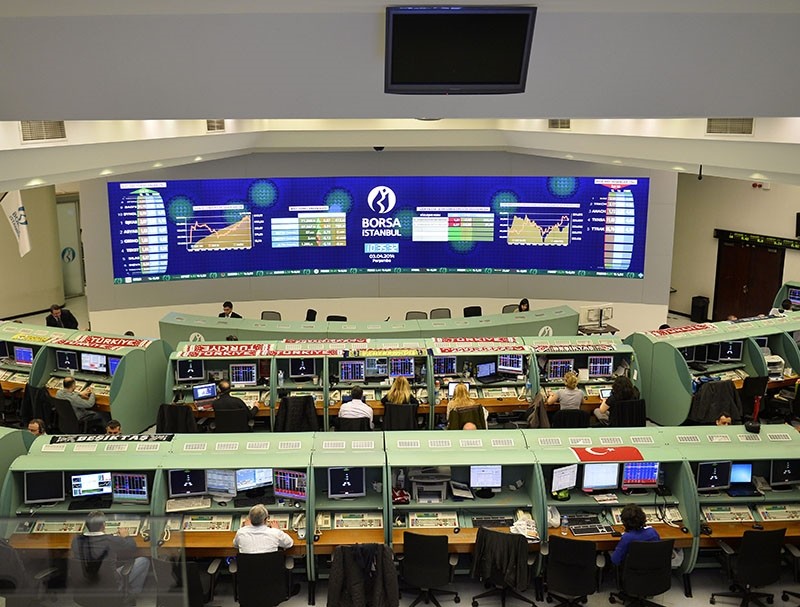
The upward trend in Turkey's Borsa Istanbul (BIST) index, ongoing since last December, hit record high of 89,500 points yesterday.
In the first transactions of the day on Thursday, the BIST 100 index rose by 0.16 percent while the banking sector index advanced by 0.50 percent, maintaining the upward trend.
The ascending movement had come to the forefront on Wednesday when the index gained over 2 percent for the first time in 21 days.
Wednesday's session saw an increase of 2.11 percent to reach 89,320 points, while Wednesday's first transactions reached 89,939 points.
Just when the Dow Jones in the U.S. topped record 21,000 for the first time in history, the record high for the BIST 100, which was recorded at 93,398 back in May 2013, hovers around 90,000.
Meanwhile, analysts have been optimistic about the rise, even discussing the possibility of the index crossing the 90,000 threshold.
What caused the index to rally?
Analysts say the environment which prepared the index for Wednesday's gains exceeding 2 percent, following long-lasting pressure, was supported by January profits from the banks and the fact that the U.S. Federal Reserve's(Fed) March interest rate hikes were already priced.
According to Ak Yatırım, the possibility of the Fed's interest rate hike in March seems to have been priced by the markets, and it is clear that the effect will not be significant if the interest rate increase decision is made.
Meanwhile, the banking sector's profit data for January that was released on Wednesday showed that it exceeded expectations and recorded a 50 percent increase than that of the previous month.
The prediction made at the Banks Association of Turkey meeting that the strong loan growth observed in the first two months of the year could keep the loan growth rate at 15 percent per annum made it clear that the increase was led by the banking shares.
Analysts predict BIST Index to exceed 90,000
Ak Yatırım, which indicated that positive opinions on the technical side continued, pointed to 93,500 as the target figure.
Accordingly, if the barrier of 89,550 points was broken, 91,500-93,500 bands, which were recorded in May 2013 and January 2015, can be targeted on a weekly basis, and at this stage, the averages on an hourly basis indicated optimism.
Sharing a similar opinion, Anadolu Yatırım, stated that as long as there was no closing below 88,400, and 89,500 can be exceeded and 90,000 and 91,500 levels can be targeted.
Meanwhile, Ziraat Yatırım was of the opinion that 90,000 will be targeted, suggesting that a strong purchase around the main support can technically increase the likelihood of breaking the barrier, and that if the level is broken, 90,000 can be targeted.
Ata Yatırım, on the other hand, stated that this time the index will break the resistance point and stay at around 90,000, recalling that the resistance point of 89,500 was tested several times in the last month, but was not broken and remained under sales pressure.
The index, which exceeded 93,000 in May 2013, entered a downward trend that would continue until January 2014 and had declined to as low as 60,898.
Following that date, pricing over 90,000 was seen in January 2015 only, and after 91,805 was tested on Jan. 28, 2015, the index dropped down to 70,000.
Foreign investors make the rally
With high possibility that the Fed will decide on an interest rate hike in its March meeting and despite theweakening of domestic bonds, the capital flow into prominent stocks of the index, yielded the rally in the BIST 100, according to analysts.
Although the global hike in the U.S. dollar created a spike of the greenback against the Turkish lira, positive global risk perception has a potential to positively impact the local markets denominated in Turkish lira. The evident surge in the domestic PMI index released on Wednesday support the upward movement in the stock market.
Moreover, U.S. President Donald Trump's speech in Congress and the positive trend in economic activity created new historic records in the stock markets and supported global risk assets and caused a soar in the dollar and interest rates denominated in the dollar.
Last week, non-residents made a $50.9 million purchase at the stock market, according to the weekly statistics released by the Central Bank of the Republic of Turkey.
